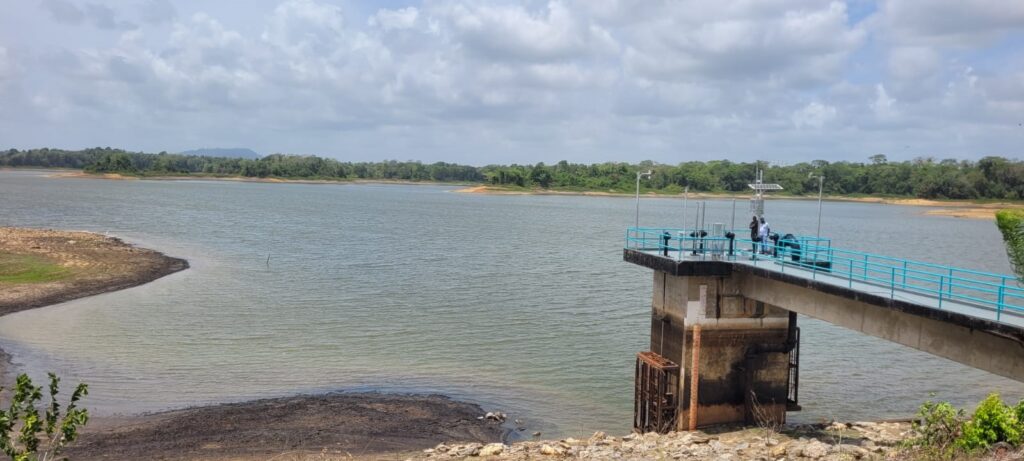Gonzales: Reservoirs empty despite heavy rain

DESPITE heavy rainfall over the past week, Public Utilities Minister Marvin Gonzales says the country’s reservoir levels are still significantly below their long-term averages.
He spoke to reporters at his ministry at Alexandra Street, St Clair, after a signing ceremony for his ministry’s US$315 million National Water Sector Transformation Programme funded by a loan from the Inter American Development Bank (IDB).
Reporters asked about the state of the reservoirs, given that Trinidad and Tobago was now in its wet season, as evidenced by recent heavy rainfall.
Gonzales said the reservoirs had not got enough rain, despite the Met Office saying TT was transitioning from dry and hazy conditions under the El Nino effect to wet conditions under the La Nina effect.
“We have not received the volumes of rainfall that can positively impact our reservoirs.”
Gonzales lamented reservoirs were now still “way below” their long-term averages.
“The Caroni-Arena is at 23 per cent when it is supposed to be at 46 per cent (as its) long-term average.”
The Hollis Reservoir is now just 28 per cent full, compared to its normal 42 per cent, he revealed.
“Navet at 22 per cent. It is supposed to be at 40 per cent, long-term average.
“So we have not gotten the type of rain that is needed to really have that positive effect on our reservoirs.
"That can only happen if we have about a week of prolonged, intense rain. Then you would start seeing our reservoirs start being replenished in a way you would expect. So we are still in a very precarious state. We are in a very delicate situation, so we have to monitor our reservoirs.”
Gonzales said while people see rainfall in their areas, this might not be happening in the areas of the reservoirs, such as Hollis, Caroni, or Navet.
“So that’s how the weather is. We are not in a good state. But we are hoping that in the next weeks, we are going to see some increased rainfall activity so our reservoirs can be full to capacity.
“We are not out of the woods as yet. While the reservoirs were now far better than a couple of weeks ago, they must be well managed in the coming weeks.”
Programme manager Gaynelle Abraham gave a project overview.
The first loan under the programme is US$80 million for 2023-2026 to improve the efficiency, quality, sustainability and resilience of TT’s water supply and water security, including a more reliable supply, better governance of water resources and climate resilience, and more access for underserved communities.
The programme has three main components, plus a US$2.81 million allocation for administrative costs.
The programme’s US$44.68 million water stabilisation and improvement component includes two new water treatment plants (Santa Cruz and Goldsborough, Tobago), five refurbished water treatment plants (Navet, Chatham, Guanapo, Freeport and North Oropouche) and six new wells (three wells at Freeport, plus one each at Chatham, Penal and Tucker Valley, Chaguaramas.)
The programme’s US$2.25 million support for water-sector transformation component includes restructuring WASA and re-assigning WASA’s water resource management role to a new integrated water-resource management entity.
The programme’s US$30.26 million water optimisation involves aged pipeline replacement, bulk meters, installing supervisory, control and data acquisition (SCADA) systems at water treatment plants and several boosters, and reducing non-revenue water.
Local IDB representative Carina Cockburn said in TT the volume of processed water for each person each year was enough to fill an Olympic-sized swimming pool, namely 220,000 gallons, way ahead of the production for Barbados, which was 37,000 gallons.
Saying TT does not have a physical scarcity of water but an economic scarcity, she said the programme will improve the latter.
IDB director Robert Le Hunte, a former minister of public utilities, similarly said TT nationals enjoy 178 gallons per person per day, compared to 65 gallons in Jamaica and 66 in Barbados. He said TT has “one of the highest rates in the world” of water supply.
While saying funding was needed to fix shortcomings in TT’s water supply system, he also said water conservation was also a civic duty for residents.
Gonzales, in his main address, said the programme would help almost every region, was done without geographical bias and was the product of three years of hard work.

Comments
"Gonzales: Reservoirs empty despite heavy rain"